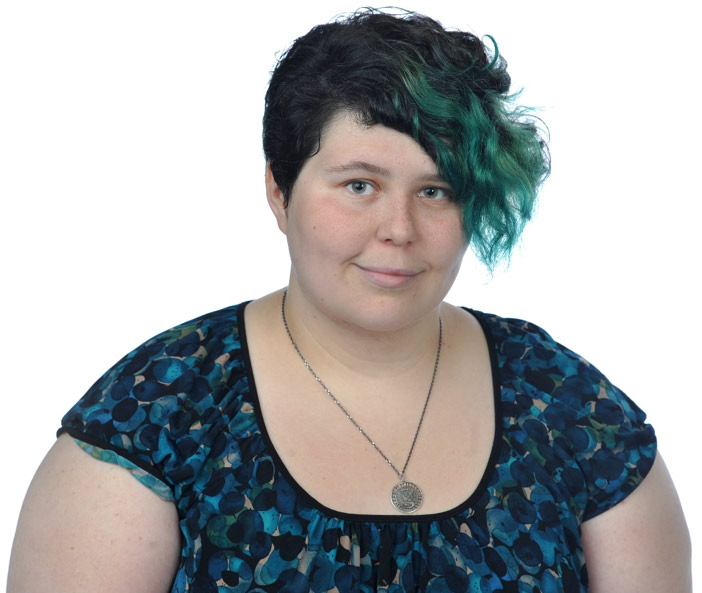Physics Ph.D. student Andrea Welsh offers advice based on personal experience

The new school year is a good time to remind ourselves to take care of our mental health.
Mental health problems are on the rise. A 2014 survey of college counseling services—cited by the American Psychological Association—found that clients with severe psychological problems went up to 52%, from 44% the year before. The survey noted increases in anxiety disorder, crises, psychiatric medication issues, and clinical depression.
The good news is that mental health awareness is growing and spreading. Also good news is the acceptance that mental health needs are real and addressing them is essential for self-care.
Last summer, a research group at the European Organization for Nuclear Research (CERN) asked physics Ph.D. student Andrea Welsh to share her experiences as a graduate student grappling with mental health concerns.
A mental health advocate, Welsh attracted attention outside of Georgia Tech after she wrote about the subject in Physics Today. She told the research group at CERN that graduate students have unique vulnerabilities. Yet her tips for managing mental health are universal.
The CERN research group was looking for someone who has experienced mental health problems, Welsh says. “That was important for representation.” By representation, Welsh means how people grappling with mental health appear to others.
In high-school, Welsh recalls, she saw depictions of people with depression as sleeping all the time and unable to get out of bed. She wasn’t like that. Yes, she cried a lot, her weight fluctuated, she had periods of high energy and bouts of low energy, and she couldn’t concentrate. But she was functional, attending school.
“Something else must be wrong with me,” she recalls telling herself. Only when she took a psychology class did it dawn on her that she must be experiencing mental health problems.
Mental health problems can be confounding because those affected often look like everyone else. Schizophrenia, mania, depression, anxiety, and mood swings can range from mild to severe. When mild, some of these conditions can go unnoticed.
Welsh is married and in her sixth year of Ph.D. studies with physics professor Flavio Fenton. She has an active social life and advocates for diversity, inclusion, and women in science at Georgia Tech. She believes it’s important to know that many people with mental health problems look like others on the outside while feeling differently on the inside.
Graduate students must be especially attuned to their mental health because the stresses of graduate school are unique, Welsh says. “Graduate student life is variable from school to school, from advisor to advisor.”
Because there are no set rules for graduate student life, graduate students can feel isolated. They may find it tough to assess if their experience is reasonable – such as working 100 hours a week or coming to an unheated lab when campus is closed at the end of the year.
“It’s hard to push back and say, no, I’m not working those hours,” Welsh says. She adds that this is not just a Georgia Tech problem; she hears similar stories from many sources.
To mitigate graduate-school uncertainties and promote care for mental health, Welsh offers some tips. Although based on Welsh’s graduate school experience, these guidelines can also work for undergraduate students, faculty, and staff.
“My hope is for people to be more open, more honest with their professors and peers, if they are having a hard time in class or in the lab,” Welsh says. “Faculty and staff go through this, too. We should check in on each other. We are a community. We need to support each other.”
Figure out your needs and boundaries.
People sometimes take on activities and responsibilities without understanding the commitments they entail. It’s fine until it’s not. By knowing your limits, you can avoid the stress and anguish of unmet expectations.
Share your needs and boundaries with people who need to know.
Some people send non-urgent emails even after midnight. Most likely, they don’t expect an immediate response. But if you’re a Ph.D. student and this email is from your advisor, what do you do? If one of your boundaries is to turn off your phone after 10 PM, tell your advisor. Ask what they expect when they send emails at unusual hours.
Discuss goals and expectations.
Have conversations with your advisor about how long it will take to complete the degree and how you will know that you’re done. Discuss the scope of, and the resources available to, your thesis project.
Know the resources available to you; seek help sooner rather than later.
“The Georgia Tech Counseling Center is a good first resource,” Welsh says. “It’s there. Don’t wait. If you see that you’re having a hard time, get help as soon as you can.”
Find campus resources online at http://www.counseling.gatech.edu/content/self-help-resources.
Other resources to tap are people in your school and around the university, such as other professors and members of your advising committee.
Meet regularly with your advising committee to assess progress of projects.
Regular meetings will reveal whether your project has commensurate resources, the scope is appropriate for one Ph.D. student, your advisor’s expectation are realistic, etc.
If your mental health is of concern, consider other options.
Switching to a class grade of pass/fail, opting for an incomplete, taking a medical leave of absence, and carrying a lighter class load can help. “None of them means failure,” Welsh says. “It just means you’re dealing with your mental health right now.”
Find communities outside of your lab.
Talk to other students outside of your school and Georgia Tech. “This can help you find out what’s reasonable and normal in graduate school,” Welsh says.
Take breaks during the work day and during the year.
If necessary, schedule time to socialize, to engage in noncurricular activities, etc.


